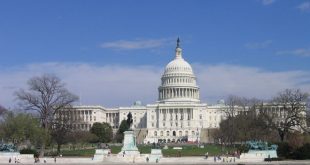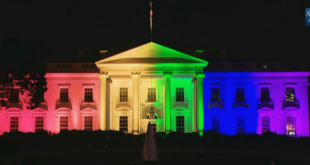 It is disheartening to see the ongoing rift between those conservatives supporting President Donald Trump and those opposing him — a rift that began before Trump and may survive his presidency.
It is disheartening to see the ongoing rift between those conservatives supporting President Donald Trump and those opposing him — a rift that began before Trump and may survive his presidency.
Many conservatives opposed Trump’s nomination because they believed he was not a true conservative — not even really a bona fide Republican — but rather a narcissistic opportunist who wanted to take his game show hosting and self-promotional platform to a grander stage.
Many also thought that a Trump presidency, even if it would somewhat forestall the Obama-Clinton agenda, would not be worth the long-term damage it would do to the conservative movement. They believed a Trump victory would embolden the so-called alt-right movement, which they saw as Trump’s main base. They saw a mob-like mentality among many of his supporters, saying they were fueled by rage and would rubber-stamp every crazy idea Trump might pursue and also push him to pursue even nuttier ideas.
Admittedly, in the red-hot contentiousness of the primary campaigns, some of the alt-right types did surface as among the most vocal of Trump supporters. Trump supporters seemed to defend anything Trump said or did, even if indefensible.
I admit that during the primaries, I was concerned about Trump’s commitment to conservatism and worried that the justifiable outrage of many of his most ardent supporters at the direction the country was headed under Obama was clouding their judgment. Trump was not the answer to the quintessentially anti-conservative and fundamentally leftist Obama.
Then two things happened. The first was that Trump won the GOP nomination fairly and squarely. This meant that he would be facing off against Hillary Clinton, the most corrupt, self-serving and politically opportunistic presidential candidate in decades — someone who had tied herself to the far left and who promised to double down on the Obama agenda.
There is nothing to blunt one’s concerns about flaws in a GOP presidential candidate like the sober realization that unless he wins, the abominable Hillary Clinton will be the next president and drive America past the point of returning to anything resembling its founding principles. Only conservatives who didn’t view America’s trajectory with similar urgency could rationalize their refusal to vote for Trump against Clinton.
This same obliviousness to the urgency of our situation also led to GOP establishment inertia regarding the Obama agenda. The establishment’s insufficient energy and willingness to oppose him sowed the seeds of Trump’s rise to power. How ironic that the people who remain most opposed to Trump today are to some extent responsible for the emergence of such an unorthodox character to fill the void they helped to create.
The second thing is that I came to realize that I had misunderstood much of Trump’s grass-roots support. Yes, grass-roots voters were convinced that there was no difference between the two parties and that only an outsider like Trump could break the mold and inaugurate a new paradigm in Washington. But they were not a mob, and they saw something that others may not have seen.
This epiphany came to me when I was debating a longtime friend who is respected in the community and every bit as conservative as I am but had supported Trump from the beginning. I saw that he was not the exceptional Trump supporter but the typical one, someone who had not given over his critical faculties to runaway emotions but who genuinely believed that Trump, flaws and all, was the answer for these unusual times. As time passed, my epiphany was repeatedly confirmed: Trump supporters are patriotic Americans — not bigots, not political illiterates, not overreacting zealots — who just wanted our country and culture back. It’s that simple.
Based on my observation of those on the right who continue to oppose, even revile, Trump at almost every turn, I conclude that their ongoing opposition can largely be traced to disagreement on the two factors I describe — not to mention a healthy dose of stubborn pride, in some cases.
Many of them still deny the urgency in the Obama-Clinton agenda and seem to hold the average Trump supporter in contempt. Another irony emerges as to their willful blindness when it comes to the imminent dangers to America from the Obama-Clinton left. While they claim to have a monopoly on pure conservatism, they frequently hold hands in shared disgust with the leftists still pushing that agenda, and they often diminish the strides Trump has made toward rolling back Obama-era “progress” and advancing conservatism. Their opposition also goes beyond policy, as evidenced by their reflexive sympathy for Trump’s Democratic Russia-collusion accusers and their revulsion at conservatives pointing to Obama and Clinton corruption. To them, even to utter criticism against Obama and Clinton is “whataboutism” — an alleged effort to divert attention from Trump’s supposed corruption. What they don’t realize is their cries of “whataboutism” reveal their own version of the malady; when you point out a Trump success, they say, “What about his character?”
The Trump opponents have a variety of excuses to deny Trump credit for advancing this agenda and discredit those who foresaw the landscape better than they. They can’t stand his tone, his manners or his tweets. They view him as temperamentally and mentally unfit for office. Even when he achieves policy success after policy success, they childishly huff that it is only because other people besides Trump are running the White House — that he has delegated foreign policy matters and “outsourced” his legislative agenda. Come on, people.
Well, I don’t know whether Trump has morphed into a full-blown ideological conservative, but I do know that he’s largely governing as one — and an effective one at that, accomplishing some bold things that few other conservative presidents would have even tried.
Why are some never-Trumpers obsessively bogged down in evaluating Trump’s character and competence and preoccupied with sanctimoniously judging Trump’s supporters instead of admitting that Trump’s supporters are just rooting for America and that Trump’s policies are — to this point — moving us back toward the direction of the American dream?
This shouldn’t be a contest over who’s more conservative; it should be about what’s best for the United States. I’m pleased with how things are going. If the conservative movement doesn’t come together in the future, I don’t think it will be primarily the fault of the Trump supporters.
COPYRIGHT 2018 CREATORS.COM
 David Limbaugh is a writer, author and attorney. His latest book is “The Emmaus Code: Finding Jesus in the Old Testament.” Follow him on Twitter @davidlimbaugh and his website at www.davidlimbaugh.com.
David Limbaugh is a writer, author and attorney. His latest book is “The Emmaus Code: Finding Jesus in the Old Testament.” Follow him on Twitter @davidlimbaugh and his website at www.davidlimbaugh.com.
The views expressed in opinion articles are solely those of the author and are not necessarily either shared or endorsed by Black Community News.
 Black Community News News and Commentary for Christians
Black Community News News and Commentary for Christians




My question is why did the Republican Party allow President Trump to run on the Republican ticket if they thought he was not a true Republican? Why do they obstruct now instead of supporting the President and the party?
The same can be said of the Democrats who lambast Bernie Sanders because he was not a Democrat although he was allowed to run as a Democrat in the primary. Sanders could have been put in as a straw man just to that Hillary had “competition” rather than being anointed.
Keen insight. Good question. Maybe there is really only one (1) big globalist party, with a few honest, conservative, people in Congress who really care about America as a sovereign nation.
Great article. Instead of moaning and groaning about Trump, conservatives should be concentrating on steering his vast energies in the right direction!
Seems to me that a lot of Republicans are conservative only when they are in the minority and the conservative agenda has no chance of actually being implemented. That would explain why, now they have a majority, they seem unwilling to act like one and actually pass conservative legislation. I suspect they’re afraid that their wealthy donors, who aren’t socially conservative – as the editors of National Review once wrote, they are for “tight money and loose morals” – would stop giving.